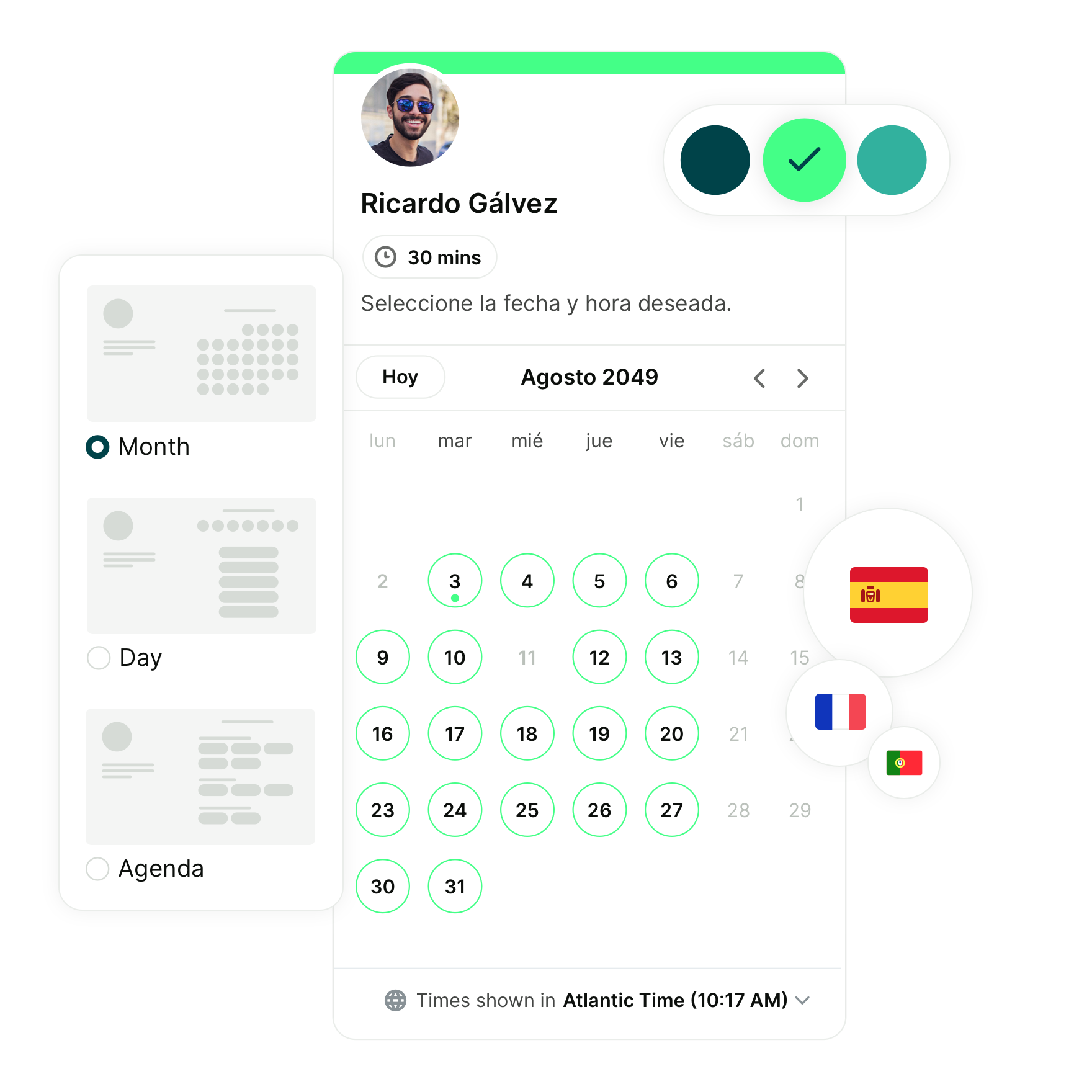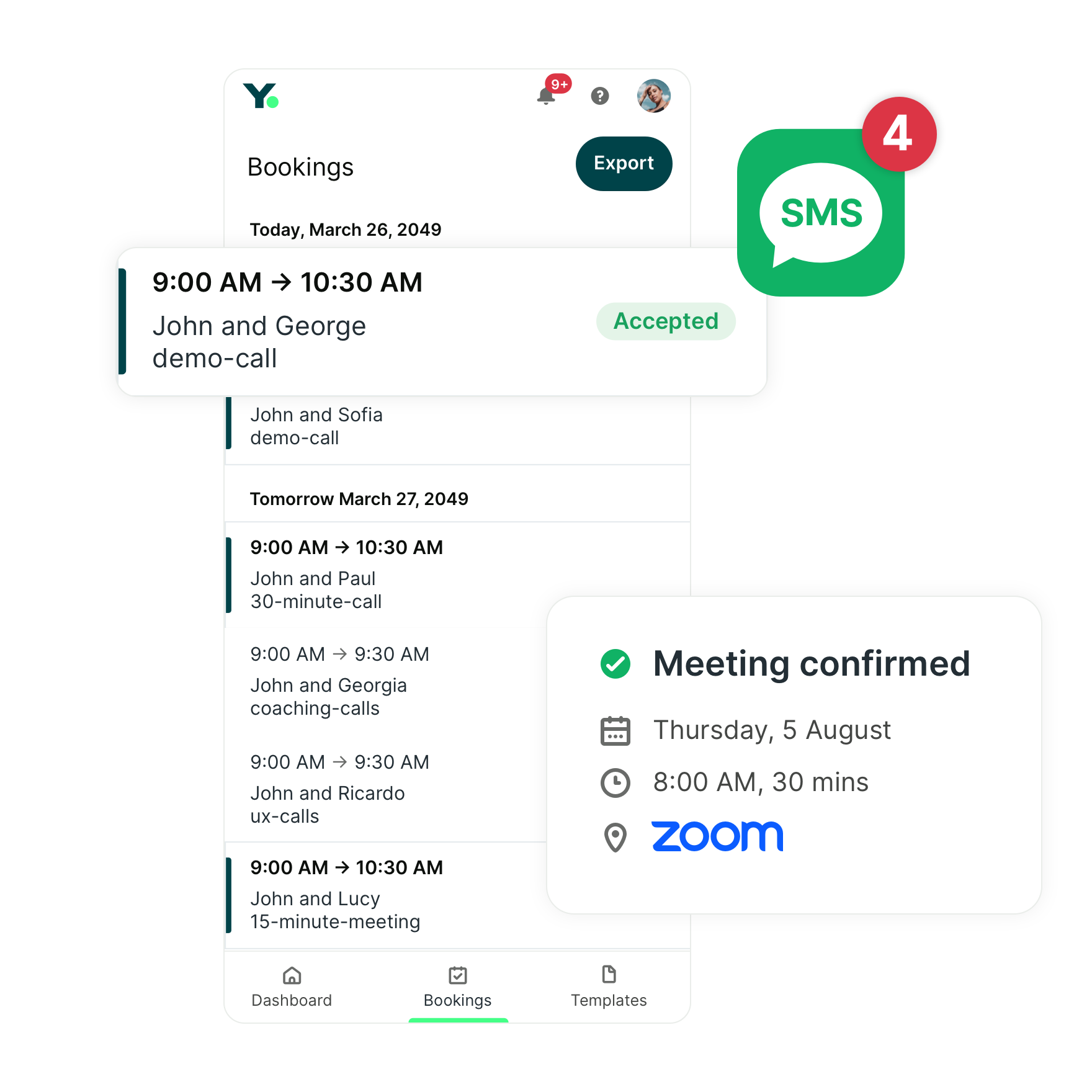Example of a Reference Letter & How to Write One
Got asked for a recommendation letter? Say less. We got everything you need—tips, tricks, and ready-to-use templates.

Paulina Major

Contents
Ready to book more meetings?

Have you ever been asked to write a reference letter and felt stuck?
Maybe a former contractor, freelancer, or colleague reached out, and you want to help—but what should you say? How much detail is enough? How do you format it properly?
In this guide, we’ll take the guesswork out of the process and help you craft a strong reference letter quickly. You’ll find:
- A breakdown of different types of reference letters
- How to get started with writing letters of recommendation
- An example of a reference letter and what to include in it
- Plug-and-play templates you can customize in minutes
Let’s begin!
Types of reference letters
There are different types of reference letters you might be asked to write depending on the situation. Here’s a quick rundown of the four main ones:
- Academic references: These are typically written for students applying to schools, scholarships, research programs, or academic positions. They focus on the applicant’s intellectual abilities, work ethic, and character.
- Employment references: Employment references are a standard part of the hiring process—94% of organizations conduct some form of candidate screening. These come from former bosses, managers, or supervisors and highlight an employee’s job performance, skills, and contributions.
- Professional references: These come from colleagues, industry peers, or business associates. They emphasize a person’s expertise, professionalism, and work ethic from a peer’s perspective.
- Client references: If you're a solopreneur or running a small business, chances are you work with freelancers and contractors. When the job’s done, they might hit you up for a reference or testimonial to help them land their next gig.
How to get started with writing a reference letter
Before you start typing or jotting anything down, take a sec to think—are you even the right person to give a reference? Do you know them well enough to vouch for their work or character?
A recommendation letter carries weight, not just for the person you’re writing about but also for you and your credibility.
1. Ask yourself: Can I genuinely recommend this person?
Not every request for a reference should be an automatic “yes.” If you can’t confidently vouch for someone’s work, reliability, or character, it’s better to politely decline. A weak or inaccurate reference can do more harm than good.
2. Clarify what they need the reference for
Different jobs, schools, and clients have different expectations. Ask the person requesting the reference what specific qualities, skills, or experiences they want to be highlighted.
- Are they applying for a leadership role? Highlight their problem-solving and teamwork skills.
- Are they seeking freelance gigs? Talk about their reliability and expertise.
- Are they a student? Focus on academic achievements and potential.
3. Outline the key points you want to cover
Before writing, jot down a quick outline:
✔️ How you know the person and for how long
✔️ What their strengths and accomplishments are
✔️ A closing statement reinforcing your recommendation
|
💡 Tip: Keep it under one page. Nobody reads long letters! |
4. Gather specific examples
If you can be specific in your reference, that’s always a bonus. Vague praises don’t do much.
Instead, think about concrete moments when they excelled. Did they lead a tough project? Deliver outstanding results? A strong reference is always backed by real examples.
❌ Weak reference: “They are a skilled designer.”
✅ Strong reference: “Their design work helped increase website conversions by 35% in three months.”
5. Choose the right template
No need to start from scratch every single time! Using a well-structured template (which we’ll provide later) makes it easier to format your thoughts quickly. Just tweak it to match the person and situation.
Now that you’ve laid the groundwork, let’s break down exactly what to include in a reference letter.
What to include in a reference letter
A strong reference letter follows a clear structure. You don’t need to overthink it—just make sure you hit the key points.
A professional greeting
Start with a formal greeting. If you know the recipient’s name, use it. If not, keep it general.
✅ Best practices:
- Dear Hiring Manager,
- Dear [insert the recipient’s name],
- Dear Admissions Committee,
- To Whom It May Concern (only if there’s no specific recipient).
A strong opening statement
Your first sentence should clearly state why you’re writing. Get to the point fast.
|
Example: “I highly recommend [Name] for [position]—they are one of the most reliable professionals I’ve worked with.” |
Your relationship with the person
Explain in what capacity you know them and for how long. This helps give credibility to your words.
|
Example: "I've hired [Name] to write website copy and create blog posts for my coaching business over the past six months." |
Their key strengths and achievements
This is the heart of your letter. Highlight their skills and give real examples.
Try to focus on measurable outcomes and concrete contributions rather than general comments. Describe how their work made a difference. And, whenever possible, support your points with metrics or specific improvements to strengthen your recommendation.
A strong closing statement + contact information
Wrap it up with a confident endorsement. Reaffirm your recommendation and offer to answer questions. Also, don’t forget to include your name, title, and contact details.
|
Example: “I highly recommend [Name] for this opportunity. If you'd like to discuss their skills, experience, or suitability in more detail, feel free to reach out to me at [email] or schedule a quick call using my scheduling link: [insert the link].” |
Speaking of scheduling links, do you have one set up? Instead of replying to extra emails about the person in question, just share your calendar link at the bottom of the reference or in your email signature.
That way, the requester can pick a time that works for them, and you can skip the back-and-forth of trying to find a time to meet.
If you need a reliable meeting scheduler, check out YouCanBookMe (YCBM). It lets you set up a customizable booking page in minutes, making it easy for others to schedule appointments with you in just a few steps. It also automates confirmations and reminders while integrating with calendars and other business tools to save you time and simplify scheduling.
Common pitfalls of writing reference letters
Writing a solid reference letter isn’t sometimes as simple as it seems. In fact, a poorly written one can do more harm than good. To ensure your letter has the right impact, here are a few things you should avoid doing:
- Over-the-top praise: It’s great to hype someone up, especially if they truly crushed it at their job. But if you go too far, it can come off as fake.
- Being too generic: On the flip side, a reference that could apply to literally anyone isn’t doing the candidate any favors. Saying they’re a “hard worker” or “great team player” means nothing without proof. Include details about their actual contributions and impact.
- Making it too long: Nobody wants to read a reference letter that's as long as a novel! A good recommendation letter should be one-page max—think five short paragraphs, tops.
Reference letter template
Alright, let’s kick things off with a basic reference letter template. This is just a starting point—you’ll need to flesh it out based on your specific situation and how much info you want to include.
Subject: Recommendation for [Candidate’s name]
Dear [Recipient’s name],
I am writing to recommend [candidate’s name] for [position, program, or opportunity]. I had the pleasure of working with them at [company/organization name] for [X years] in my role as [your job title].
While working together, [Candidate’s name] consistently demonstrated [top quality—reliability, expertise, professionalism].
One standout moment was when [describe a specific project, achievement, or challenge they handled successfully]. Their ability to [mention key skill] led to [positive outcome].Beyond their professional skills, [Candidate’s name] is also [mention a personal or soft skill—collaborative, proactive, adaptable]. A great example was when [describe another situation highlighting their strengths]. Their approach to [specific task or skill] made a significant impact.
I strongly recommend [Candidate’s name] for [position or opportunity]. Please feel free to contact me at [your email] or [your phone number] if you need any further information.
Best regards,
[Your name]
[Your job title]
[Company name]
[Your contact details]

To use this template, you should:
- Personalize it: Fill in the brackets with details specific to the person you're recommending.
- Be specific: Use real examples of their skills and achievements.
- Match it to the role: If you know what job they’re applying for, highlight skills relevant to that position.
Now, let’s see this template in action.
Say you’re a small business owner, and your personal assistant just gave their notice because they’re moving to another city. Now, they’re applying for a new role and need a reference letter. You want to help them land a great job, but you’re not sure how to put everything they’ve done into words.
Here’s how you’d write it:
|
Subject: Recommendation for Anna Martinez Dear Hiring Manager, I am writing to recommend Anna Martinez for a personal assistant role. I had the pleasure of working with Anna at Happy Rental Solutions for three years in my role as Founder and CEO. During our time working together, Anna consistently demonstrated reliability, professionalism, and top-tier organizational skills. One standout moment was when she completely revamped our scheduling system, reducing no-shows by 35%. Her ability to anticipate needs and proactively solve problems made a huge difference in our daily operations. Beyond her professional skills, Anna is incredibly adaptable and a fantastic communicator. A great example was when she noticed a scheduling conflict during a major client project and rearranged meetings seamlessly—without me even needing to ask. Her ability to stay two steps ahead kept things running smoothly and stress-free. I strongly recommend Anna for any personal assistant or administrative role. Please feel free to contact me at laura@email.com or (555) 123-4567 if you need any further information. Best regards, Laura Smith |
Examples of reference letters for different types of needs
1. Academic reference
Subject: Recommendation for [Student’s name]
Dear [Recipient’s name],
It’s not every day that I come across a student like [Student’s name]. In my [X] years as a [Your job title] at [Institution name], I’ve taught many bright students, but [Student’s name] stands out.
From day one in my [Course name] class, they showed an impressive ability to grasp complex ideas quickly. Their work on [specific project, paper, or research] demonstrated [key skill—critical thinking, problem-solving, creativity]. More than just excelling academically, they elevated class discussions and inspired their peers.
What truly sets [Student’s name] apart is their curiosity and drive. They don’t just look for the right answer—they dig deeper. When faced with a challenge, they persist. I saw this firsthand when [describe a real moment that showcases their initiative or originality].
I have no doubt [Student’s name] will thrive in [program, scholarship, or opportunity]. Please feel free to contact me at [your email] or [your phone number] for further details.
Kind regards,
[Your name]
[Your job title]
[Institution name]
[Your contact details]

2. Employment reference
Subject: Recommendation for [Candidate’s name]
Dear [Hiring Manager/Recruiter],
I’m pleased to recommend [Candidate’s name] for [position]. Having worked with them at [Company name] for [X years] as [Your job title], I can confidently say they are an asset to any team.
[Candidate’s name] excels in [key strength—problem-solving, leadership, efficiency]. A great example is when [describe a specific project, challenge, or achievement]. Their ability to [mention skill] led to [positive outcome—cost savings, revenue growth, operational improvements].
What sets [Candidate’s Nnme] apart is their [soft skill—adaptability, teamwork, initiative]. When [describe another situation highlighting their impact], they stepped up and delivered beyond expectations.
Any organization would benefit from [Candidate’s name]’s expertise and dedication. I’d be happy to provide more details—feel free to reach out as per my contact details below.
Best,
[Your name]
[Your job title]
[Company name]
[Your contact details]

3. Professional reference
Subject: Endorsement for [Candidate’s name]
Dear [Recipient’s name],
I’m happy to recommend [Candidate’s name] for [position, opportunity, or project]. I’ve had the privilege of working with [them] for [X years] in my role as [Your job title] at [Company name], and their expertise has been invaluable.
[Candidate’s name] brings [key strength—strategic thinking, problem-solving, leadership] to every project.
A great example was when [describe a specific achievement or challenge they handled]. Their ability to [mention skill] directly led to [positive impact—client success, business growth, improved efficiency].
What makes [Candidate’s name] stand out is [soft skill—collaboration, adaptability, initiative]. When faced with [describe situation], they approached it with [mention positive trait] and delivered beyond expectations.
I wholeheartedly recommend [Candidate’s name] for this opportunity. If you need any additional details, don’t hesitate to reach out as per the contact details below.
Best,
[Your name]
[Your job title]
[Company name where you worked with the candidate]
[Your contact details]

4. Client reference
Subject: Recommendation for [Insert name]
Dear [Recipient’s name],
We had the pleasure of contracting [Insert contractor’s name] to help us with [specific service—branding, marketing, consulting, IT solutions] over the past [X months/years], and their expertise was invaluable. From the start, they brought fresh ideas, a strategic approach, and a deep understanding of our needs.
One of their biggest contributions was [describe a project or challenge they solved]. Thanks to their [mention skill—problem-solving, creativity, efficiency], we saw [specific positive outcome—growth, efficiency, engagement increase]. Their ability to turn complex issues into actionable solutions made a huge difference for our business.
Aside from their technical abilities, [Contractor’s name] was a pleasure to work with—reliable, proactive, and always professional. They delivered on time, communicated clearly, and ensured every detail was handled with care.
I strongly recommend [Contractor’s name] for [position, project, or opportunity]. If you need further details, feel free to reach out at [your email] or [your phone number].
Best,
[Your name]
[Your business name]
[Your contact details]

Parting thoughts
Writing a reference letter is a responsibility, but now you have the tools to do it right. The next time someone asks, don’t stress—just follow the steps in this guide and use the templates to help you.
📌 Your action step: Bookmark this page and save the templates. That way, you’ll always have a strong reference letter ready when needed.
FAQ
Can I refuse to write a reference letter?
Yes, you can refuse to write a reference letter. If you don’t feel comfortable vouching for someone—maybe you don’t know them well enough or just don’t think their work quality is good—it’s better to pass. Giving a half-hearted or misleading reference can have ethical and professional consequences. Politely explain that you don’t feel like the best person to write it.
How long should an academic reference letter be?
Most academic reference letters should be between 1 and 1.5 pages (approximately 400–600 words). The letter should focus on the candidate’s strengths and suitability for the program. Before writing, confirm if the requesting institution has any specific word count or formatting guidelines.
Is 300 words enough for an employment reference letter?
There’s no universal rule on how long an employment reference letter should be, but 300 words usually suffice. Anything longer than a page may be excessive—concise, direct endorsements are more impactful. Focus on the candidate’s strengths and avoid unnecessary fluff.
Expert advice to help you crush your next growth milestone.
Sign up to get the latest strategies and booking hacks delivered straight to your inbox.
Written by
Paulina Major
Paulina grew up wanting to be a commercial pilot, but life steered her toward content writing. With a passion for tech and business, she’s found her calling in helping brands share their stories every day. Her non-negotiable? Morning coffee—because nothing starts without that first sip.



